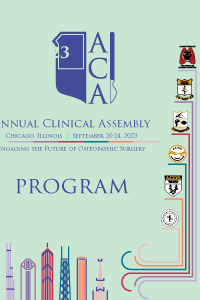General Surgery
Battery Ingestion with Colonic Perforation after Colostomy Closure in a Toddler
- AL
Annamarie Lukish, M.S.
Kansas City University College of Osteopathic Medicine
Lutherville, Maryland, United States
Primary Presenter(s)
Disc and button battery ingestion in children is common. In fact, data reports a dramatic increase in battery ingestion during the coronavirus disease 2019 pandemic likely as a result of increased household population density and electronic product utilization. These batteries often remain lodged in the esophagus causing potentially devastating complications if they are not removed urgently. Batteries that are passed beyond the esophagus usually do not cause any complications.
The following case offers an opportunity to discuss the concerns of battery ingestion and postoperative care following intestinal surgery in children. This case of colonic perforation in the postoperative period has never been reported and can advise on how toddlers are supervised and managed in the postoperative period.
Methods or Case Description:
A 15-month-old male born with imperforate anus underwent a colostomy takedown following a posterior sagittal anorectoplasty 2 months prior. He recovered uneventfully and was discharged on a regular diet on postoperative day 3. On postoperative day 5, the patient had a fever and intolerance of feeds, followed by emesis. The mother was quick to contact our team because of the recent surgery, and she came to the emergency room within 24 hours of these symptoms. On exam, the child was in distress with abdominal distention and diffuse tenderness. His laboratory findings were consistent with a systemic inflammatory response including an elevated white blood cell count of 15.8 with a significant left shift. The differential diagnosis included postoperative abscess, anastomotic dehiscence, viral or bacterial gastroenteritis, and postoperative ileus. Acute abdominal series revealed pneumoperitoneum and a 21 mm disc battery in the left lower quadrant. He was resuscitated and taken to the operating room for abdominal exploration. He was found to have purulent abdominal fluid. The anastomosis was examined, and the battery was found to have perforated the anterior aspect of the colocolostomy. There was significant fibropurulent exudate and acute inflammation at the site. The battery was removed, and the anastomosis was excised and a colostomy with Hartman's pouch was performed. The anastomosis on pathologic evaluation had evidence of significant acute and chronic mucosal inflammation. The toddler recovered uneventfully and was discharged on postoperative day 3. He underwent a successful colostomy closure 3 months after this complication and is doing very well.
Outcomes:
There has been a nearly sevenfold increase in the incidence of severe morbidity and fatalities due to battery ingestion over the last decade, believed to be related to more powerful batteries needed for contemporary electronics.1 It is possible that the increased sharing of the home environment between parents and children during the COVID-19 pandemic may have exacerbated the risk of battery ingestion in children.2 In the Journal of Pediatric Gastroenterology and Nutrition, Pizzol et al documented a ninefold increase in battery ingestion during Italy's 2-month pandemic lockdown compared with the same 2-month period in the each of the 4 years prior.3 We speculate that the pandemic may have increased the risk for this child.
In searching the world's literature, two reports of perforation in a Meckel's diverticulum after battery ingestion were found.4,5 Colonic perforation from battery ingestion associated with a colo-colonic anastomosis has never been reported. Logic would predict that any anatomic area of stasis or dysmotility would increase the risk for battery lodgment and subsequent perforation.
Prevention of ingestion in the first place is the key to avoiding such accidents in children. The primary health team can play a significant role in advising caregivers on how to make the home a safe environment for children.6 There is often anxiety for families during the postoperative recovery of their children at home.7 This has been compared to a type of post-traumatic stress disorder, resulting in fatigue and potential loss of focus.8 With stress running high for families, it is easy for parents to let their guard down when it comes to home safety, resulting in potential increased risk of accidental ingestion by children.
1. Laulicht B, Traverso G, Deshpande V, Langer R, Karp JM. Simple battery armor to protect against gastrointestinal injury from accidental ingestion. Proc Natl Acad Sci U S A 2014; 111 (46) 16490-16495.
2. Di Renzo L, Gualtieri P, Pivari F. Eating habits and lifestyle changes during COVID-19 lockdown: an Italian survey. J Transl Med. 2020;18(01):229. doi: 10.1186/s12967-020-02399-5.
3. Pizzol A, Rigazio C, Calvo P L. Foreign-body Ingestions in Children During COVID-19 Pandemic in a Pediatric Referral Center. JPGN Rep. 2020;1(02):e018. doi: 10.1097/PG9.0000000000000018.
4. Karaman A, Karaman I, Erdoğan D. Perforation of Meckel's diverticulum by a button battery: report of a case. Surg Today. 2007;37(12):1115–1116.
5. Ozokutan B H, Ceylan H, Yapıcı S, Sımsık S. Perforation of Meckel's diverticulum by a button battery: report of two cases. Ulus Travma Acil Cerrahi Derg. 2012;18(04):358–360.
6. Paul S P, Hawes D, Taylor T M. Foreign body ingestion in children: case series, review of the literature and guidelines on minimising accidental ingestions. J Fam Health Care. 2010;20(06):200–204.
7. Pomicino L, Maccacari E, Buchini S.Levels of anxiety in parents in the 24 hr before and after their child's surgery: a descriptive study J Clin Nurs 201827(1-2):278–287.
8. Ben Ari A, Margalit D, Udassin R, Benarroch F. Traumatic stress among school-aged pediatric surgery patients and their parents. Eur J Pediatr Surg. 2019;29(05):437–442.
Conclusion:
Disc and button battery ingestion is very common in children and can lead to devastating consequences. Our case of colonic perforation in the postoperative period in a toddler has never been reported and is concerning. During the COVID-19 pandemic when household population density and electronic product utilization are at a maximum, it may be prudent to provide additional guidance at discharge. Discussions with the family regarding battery and foreign body ingestion may be beneficial in avoiding a similar complication in the future.

